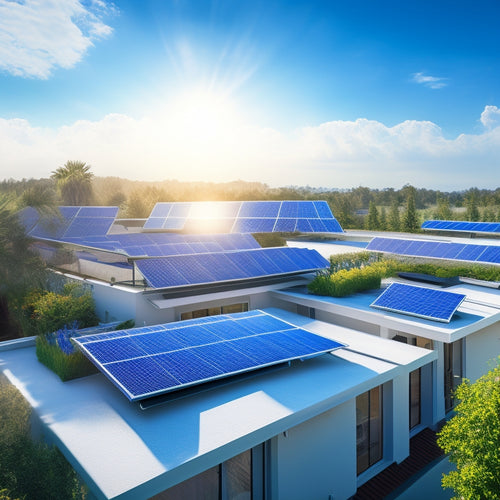
10 Best Residential Panel System Installation Prices
Share
Your residential solar panel system installation price will likely fall between $15,000 and $30,000 or more, depending on factors like system size, equipment quality, and local labor costs. With average costs ranging from $2.50 to $3.50 per watt, you'll want to take into account labor costs, permits, and equipment type to get the best deal. Manufacturer discounts, government rebates, and tax credits can also reduce upfront costs. As you explore your options, you'll find that understanding the factors that impact pricing will help you make an informed decision - and there's more to discover about finding the right installation for your budget.
Key Takeaways
• Average residential solar panel system costs range from $15,000 to $30,000 or more, depending on system size and complexity.
• Labor costs, including installation, permits, and inspections, can add 10% to 20% to the total expense.
• High-quality equipment and reputable installation companies may charge more, but ensure better performance and longevity.
• Incentives like tax credits, rebates, and manufacturer discounts can reduce upfront costs, making solar panels more affordable.
• System size is influenced by energy usage, roof size, and local building codes, which affect the overall installation price.
Average Cost of Solar Panels
When you start exploring solar panel systems, one of the first questions that comes to mind is how much they cost, and the average cost of solar panels can vary widely depending on several factors.
The cost of solar panels can range from $2.50 to $3.50 per watt, which translates to around $15,000 to $21,000 for a typical residential system. However, you may not have to pay the full upfront cost thanks to solar incentives. The federal government offers a 26% tax credit for solar installations, and some states and utilities offer additional rebates.
In addition, going solar can provide significant environmental benefits, including reducing your carbon footprint and reliance on fossil fuels. By investing in solar panels, you'll not only save money on your electricity bills but also contribute to a cleaner, more sustainable future.
As you consider the cost of solar panels, keep in mind that the long-term savings and environmental benefits can make it a worthwhile investment for your home and the planet.
Residential Solar Installation Costs
You'll need to factor in the cost of installation when calculating the total price of your residential solar panel system, as labor costs can add up to 10% to 20% of the total expense. This includes the cost of hiring a professional team to design, install, and connect your solar panel system to the grid. Additionally, you'll need to take into account the cost of permits, inspections, and any necessary upgrades to your electrical infrastructure.
In addition, you can take advantage of solar incentives, such as the federal solar investment tax credit (ITC), which can provide a significant tax credit for your solar panel system.
Moreover, if you're planning to install energy storage solutions, such as batteries, you'll need to factor in the cost of these components as well. Energy storage can increase the overall cost of your solar panel system, but it can also provide backup power during outages and optimize your energy usage.
When evaluating installation costs, be sure to get quotes from multiple installers to compare prices and services. Also, take into consideration the quality of the installation, the warranty offered, and the installer's reputation in the industry.
Best Solar Panel Deals Today
As you've factored in the costs of installation, permits, and upgrades, it's time to explore the best solar panel deals available in the market today, which can help you maximize your investment.
With the rising demand for renewable energy, many companies are offering competitive pricing and attractive packages to attract customers.
When searching for the best deals, look out for the following:
-
Solar Incentives: Federal and state governments offer incentives, such as tax credits and rebates, to encourage the adoption of solar energy. These can greatly reduce your upfront costs.
-
Government Rebates: Many governments offer rebates and grants to homeowners who install solar panels, which can help offset the initial investment.
-
Manufacturer Discounts: Keep an eye out for discounts offered by solar panel manufacturers, which can range from 5% to 20% off the total cost.
Top Solar Installation Companies
Five top solar installation companies dominate the market, offering competitive pricing, quality equipment, and exceptional customer service. When selecting a solar installation company, it is crucial to take into account factors such as company reputation, industry trends, and customer reviews. Here's a breakdown of the top solar installation companies:
| Company | Industry Recognition |
|---|---|
| Sunrun | Ranked #1 in customer satisfaction by Solar Power World |
| Vivint Solar | Featured in Forbes' America's Most Promising Companies list |
| Tesla Energy | Pioneer in solar energy storage and electric vehicles |
| SunPower | Winner of the 2020 Intersolar Award for Outstanding Solar Project |
These companies have established themselves as leaders in the solar industry, offering a range of services and products that cater to different customer needs. By selecting a reputable solar installation company, you can ensure a smooth installation process and efficient energy output. Stay ahead of the curve by taking into account industry trends and company reputation when making your decision.
Solar Panel System Pricing
Your residential solar panel system installation price depends primarily on the system size, quality of equipment, and installation company you choose. These factors can greatly impact the overall cost of your solar panel system.
When it comes to the system size, a larger system will generally cost more, but it will also generate more electricity, increasing your energy efficiency.
The quality of equipment is also important, as high-quality equipment may be more expensive upfront, but it will last longer and provide better performance.
Additionally, the installation company you choose can influence the price. Be sure to research and compare prices from different companies to find the best deal.
Some important factors to keep in mind when evaluating solar panel system pricing include:
-
Solar Incentives: Federal and state governments offer incentives, such as tax credits, to encourage the adoption of solar energy.
-
Energy Efficiency: A more efficient system will generate more electricity, reducing your energy costs and increasing your savings.
-
Warranty and Maintenance: A thorough warranty and maintenance plan can provide peace of mind and protect your investment.
Residential Solar Panel Quotes
When obtaining residential solar panel quotes, you'll want to compare prices and services from multiple installers to make sure you're getting the best deal for your solar panel system. You'll need to evaluate the quotes based on factors such as panel quality, system size, and warranty offered. Be wary of extremely low prices, as they may indicate low-quality panels or inadequate installation.
A reputable installer will provide a detailed quote that includes the system's specifications, installation timeline, and maintenance requirements. Look for quotes that include a thorough assessment of your energy usage and a customized system design. A good installer will also provide information on the solar savings you can expect from the system, including the amount of electricity you'll produce and the potential for net metering credits.
When comparing quotes, make sure to check the certifications and licenses of the installers, as well as their reputation and customer reviews. By conducting your due diligence, you can guarantee that you're getting a high-quality system that meets your energy needs and provides long-term solar savings.
Cost of Solar Panels Installed
Once you've compared quotes and chosen a reputable installer, it's time to assess the cost of solar panels installed, which typically ranges from $15,000 to $30,000 or more, depending on the system size and quality of equipment. This upfront investment can seem overwhelming, but it's crucial to take into account the long-term benefits, including significant energy savings and a reduced environmental impact.
Here are a few key factors to keep in mind when evaluating the cost of solar panels installed:
-
System size: A larger system will naturally cost more, but it will also generate more electricity and increase your energy savings.
-
Equipment quality: High-efficiency panels and premium inverters may come at a higher cost, but they can provide better performance and longer lifetimes.
-
Installation complexity: Installations with complex roof layouts or additional features, such as energy storage systems, may require more labor and materials, increasing the overall cost.
Solar Panel Installation Pricing
As you consider solar panel installation, you're likely wondering what it'll cost to get the system up and running. The good news is that installation prices have decreased over the years, making it more affordable for homeowners like you.
Let's break down the system installation costs and average price ranges to give you a better understanding of what to expect.
System Installation Costs
Your solar panel system installation costs will depend on several factors, including the size of the system, type and quality of equipment, and local labor costs. As you consider upgrading your home with energy-efficient solutions, it's crucial to understand the breakdown of these costs.
When it comes to energy efficiency, home upgrades like solar panels can greatly reduce your energy bills. However, the initial investment can be substantial. Here are some key factors that influence your system installation costs:
-
System size and complexity: The larger the system, the more expensive it will be. More complex systems with advanced features, like energy storage, will also increase costs.
-
Equipment quality and type: High-efficiency panels and premium inverters come at a higher cost than standard equipment.
-
Local labor costs and permits: Installation companies with higher labor rates and areas with stricter permitting requirements will drive up costs.
Understanding these factors will help you make informed decisions about your solar panel system installation. By balancing your energy efficiency goals with budget considerations, you can create a home upgrade that meets your needs and saves you money in the long run.
Average Price Ranges
As you explore the world of residential solar panel systems, understanding the average price ranges is vital. Solar panel installation prices vary widely, but on average, homeowners can expect to pay between $2.50 and $3.50 per watt, with the total cost of a residential solar panel system ranging from $15,000 to $30,000 or more, depending on the system size and quality of equipment.
When considering energy efficiency, it's important to weigh the costs against the benefits. While the upfront investment may seem steep, solar panels can greatly reduce your energy bills and even increase your property value. According to market trends, the demand for solar energy is on the rise, driving innovation and reducing costs.
As you navigate the market, be prepared to encounter varying prices based on factors such as system size, panel quality, and installation complexity. Keep in mind that high-efficiency panels may come at a premium, but they can offer greater energy yields and longer lifetimes.
Residential Solar System Cost
As you explore the residential solar system cost, you'll want to understand the breakdown of system costs, including hardware, labor, and permits.
You'll also need to take into account the average installation cost, which varies depending on factors like system size and installation company.
System Costs Breakdown
Breaking down the costs of a residential solar system installation reveals a complex array of components, each contributing to the overall price tag. As you explore the specifics, it becomes evident that understanding the individual costs is vital for making an informed decision.
You want to know where your money is going, and what you're getting in return.
A component analysis is essential for achieving cost transparency. Here are some key takeaways:
-
Hardware costs: The cost of solar panels, inverters, and mounting equipment accounts for the largest chunk of the overall expense.
-
Labor costs: Installation, wiring, and connection fees make up a significant portion of the total cost.
-
Permitting and inspection fees: Local permits, inspections, and interconnection fees add to the overall expense.
Average Installation Cost
You're probably wondering what the average cost of a residential solar system installation is, given the various components and expenses involved. The good news is that the cost of solar panels has decreased considerably over the years, making it a more viable option for homeowners.
On average, the total installation cost of a residential solar system ranges from $15,000 to $30,000, depending on the system size and quality of equipment.
However, it's crucial to keep in mind that the upfront cost is just the beginning. Solar panels can provide substantial cost savings in the long run, thanks to increased energy efficiency and reduced electricity bills.
In fact, solar panels can save homeowners between $400 and $1,000 per year on their energy bills, depending on their energy usage and local electricity rates.
System Size Factors
When determining the cost of a residential solar system, the system size is a critical factor, as it directly impacts the number of panels required and ultimately, the overall installation price. As you consider your solar system, you'll need to think about the size of the system that's right for your home. The size of your system will depend on several factors, including your energy usage, roof size, and local building codes.
Here are some key considerations that can impact your system size:
-
Roof orientation: The direction your roof faces can affect the number of panels you need. South-facing roofs receive the most sunlight, while east- or west-facing roofs may require more panels.
-
Shading analysis: Shading from trees, buildings, or other obstructions can reduce the efficiency of your solar panels. A shading analysis can help identify the best placement for your panels.
-
Local building codes: Local regulations may dictate the size and type of solar system you can install on your roof.
Best Solar Installation Prices
Your solar installation prices will depend on various factors, including the system size, panel quality, and installation company. As you explore the market, you'll find that prices vary greatly depending on these factors.
For instance, high-efficiency panels from top manufacturers like Tesla or SunPower will cost more than standard panels from Chinese manufacturers. Additionally, the installation company's reputation, experience, and certifications will impact the overall cost.
To get the best solar installation prices, it's crucial to research and compare quotes from different companies. You should also consider the solar incentives available, such as the 30% federal tax credit, which can greatly reduce your upfront costs.
Moreover, investing in energy-efficient systems can lead to long-term savings on your electricity bills. When evaluating quotes, make sure you're comparing apples to apples by considering the system's energy output, warranty, and maintenance requirements.
Frequently Asked Questions
How Long Does a Typical Solar Panel Installation Take?
You'll spend around 3-5 days on the permitting process, and 1-3 days on installation phases, making the typical solar panel installation take around 4-8 days, depending on your local government's efficiency and crew size.
Can I Install Solar Panels on My Own Roof?
'As you gaze up at your roof, wondering if you can harness the power of the sun, the question lingers: can you install solar panels on your own roof? While DIY feasibility is tempting, thorough roof preparation is vital, requiring expertise and precision to guarantee a safe, efficient system.'
Are Solar Panels Affected by Weather Conditions?
When you install solar panels, you'll notice that weather conditions impact energy production. On cloudy days, energy output decreases by up to 20%. Even rainy mornings can reduce efficiency by 10-15%.
Can I Add More Panels to My Existing System Later?
You can expand your existing system through system expansion, adding more panels to increase energy production, and even upgrade to more efficient panels through panel upgrades, giving you more power and flexibility.
Will Solar Panels Increase My Property Value?
You'll likely see an appraisal benefits boost, as solar panels increase your property value, providing a significant real estate boost, which can lead to a higher selling price if you decide to sell your home.
Related Posts
-

What You Need to Know About Permits and Inspections
You need to navigate the complex landscape of permits and inspections to guarantee your project complies with local z...
-

What Are the Average Cost Savings of Solar Panels
You can expect to save between $400 and $1,000 per year on your electricity bills with solar panels, which translates...
-

Best Solar Panel Options for Maximum Energy Savings
You can maximize your energy savings with solar panels that boast efficiency ratings above 20%, paired with extensive...


